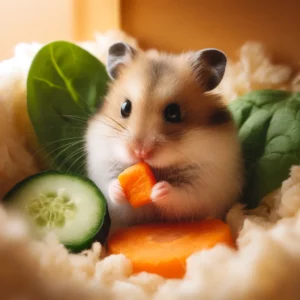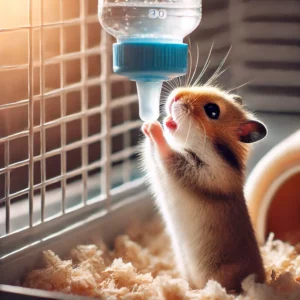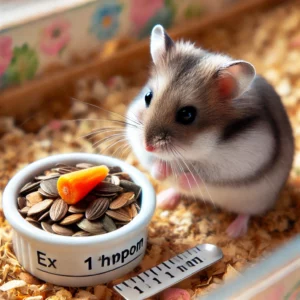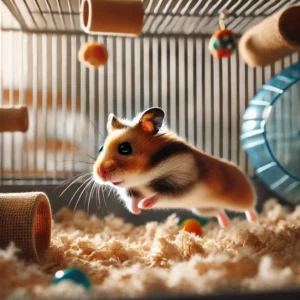Hey there, fellow dwarf hamster enthusiasts! Let’s dive into the fascinating world of these adorable little critters and explore why nutrition plays such a crucial role in their well-being. As a proud owner of a dwarf hamster myself, I’ve learned firsthand how a balanced diet can make all the difference in keeping our furry friends happy, healthy, and full of energy.
Essential Nutrients for Dwarf Hamsters
Alright, let’s get down to the nitty-gritty of what our tiny companions need to thrive. Just like us, dwarf hamsters require a well-rounded diet packed with essential nutrients. Protein is a must for their growth and repair, so make sure to include some tasty mealworms, boiled eggs, or high-quality hamster pellets in their diet. But don’t go overboard – moderation is key!
Carbohydrates are the fuel that keeps our little ones zooming around their cages. Seeds, grains, and fruits are excellent sources of carbs, but remember to offer them as occasional treats rather than the main course. Fats are also important for maintaining a glossy coat and healthy skin. Sunflower seeds and nuts are great options, but keep the portions small to prevent unwanted weight gain.
 Let’s not forget about the unsung heroes: vitamins and minerals. These tiny but mighty nutrients are essential for various bodily functions. Fruits and veggies like carrots, apples, and spinach are packed with vitamins A, D, E, and B complex. Mix things up to ensure your hamster gets a wide array of nutrients and to prevent any deficiencies.
Let’s not forget about the unsung heroes: vitamins and minerals. These tiny but mighty nutrients are essential for various bodily functions. Fruits and veggies like carrots, apples, and spinach are packed with vitamins A, D, E, and B complex. Mix things up to ensure your hamster gets a wide array of nutrients and to prevent any deficiencies.
Last but not least, always keep your dwarf hamster hydrated with fresh, clean water. A water bottle is the way to go to avoid spills and keep the water pristine. Dehydration can lead to serious health issues, so never underestimate the power of H2O!
Common Nutritional Deficiencies and Their Impact
Even with the best intentions, sometimes our little buddies might not be getting all the nutrients they need. It’s crucial to know the signs of common nutritional deficiencies so you can take action before things get serious.
If your dwarf hamster seems sluggish, isn’t growing as expected, or has a lackluster coat, a protein deficiency might be the culprit. Time to amp up the mealworms or boiled eggs in their diet! Vitamin and mineral deficiencies can manifest in various ways, such as weight loss, poor fur quality, or unusual behaviors. Fresh fruits and veggies are usually the solution, but in some cases, a specialized supplement might be necessary.
 Keep an eye out for dehydration, especially during warmer months. Sunken eyes, a dry mouth, and lethargy are all red flags. Make sure your hamster always has access to fresh water and check their water bottle regularly to ensure it’s functioning properly.
Keep an eye out for dehydration, especially during warmer months. Sunken eyes, a dry mouth, and lethargy are all red flags. Make sure your hamster always has access to fresh water and check their water bottle regularly to ensure it’s functioning properly.
Overindulging in fatty or sugary foods can lead to dietary imbalances, which can contribute to diabetes and obesity – common issues in dwarf hamsters. Keep a close eye on their diet and aim for balance to keep these problems at bay.
By recognizing and addressing these deficiencies early on, you can save yourself a lot of worry and your hamster a lot of discomfort. Regular check-ups with the vet and being observant about changes in behavior or appearance are your best bets for keeping your furry friend in tip-top shape.
Choosing the Right Food for Your Dwarf Hamster
When it comes to feeding your dwarf hamster, you’ve got options: commercial hamster food or a homemade diet. Both have their pros and cons, so let’s break it down.
Commercial foods are convenient and typically well-balanced, but not all brands are created equal. Opt for high-quality pellets with whole grains and natural ingredients, and steer clear of artificial colors and additives. Your hamster deserves the best!
 Homemade diets, on the other hand, offer fresh and wholesome options but require some careful planning to ensure your hamster gets all the necessary nutrients. A mix of seeds, grains, fresh fruits, and vegetables, along with small portions of protein-rich foods like mealworms or eggs, can create a well-rounded diet.
Homemade diets, on the other hand, offer fresh and wholesome options but require some careful planning to ensure your hamster gets all the necessary nutrients. A mix of seeds, grains, fresh fruits, and vegetables, along with small portions of protein-rich foods like mealworms or eggs, can create a well-rounded diet.
When it comes to fruits and veggies, stick to hamster-safe options like apple slices, carrots, spinach, and broccoli. Avoid citrus fruits, onions, garlic, and processed foods, as dwarf hamsters have sensitive digestive systems.
Deciphering pet food labels can be a challenge, but it’s essential for making informed choices. Look for labels that provide detailed nutritional content rather than vague terms. Whole ingredients are a good indicator of quality, while excessive fillers or high sugar content should be avoided.
If you decide to switch up your hamster’s diet, take it slow. Gradual transitions over the course of a week, mixing new food with the old, can help prevent digestive upset and minimize stress for your furry friend.
Practical Feeding Tips and Maintaining a Healthy Diet
Consistency is the name of the game when it comes to feeding your dwarf hamster. Stick to a regular feeding schedule, preferably once in the evening, to align with their nocturnal nature and reduce stress.
Keep an eye on those portion sizes! Overfeeding can lead to obesity and other health issues. A tablespoon of food per day is usually plenty, but monitor your hamster’s weight and adjust portions as needed.
Healthy treats can be a great way to bond with your hamster and even aid in training. Offer small pieces of fresh fruit or vegetables occasionally, but steer clear of sugary or fatty snacks. Moderation is key to maintaining a balanced diet and preventing health problems.
Don’t forget to keep your hamster’s feeding area clean and safe. Dirty food dishes can harbor bacteria and attract pests, posing health risks. A quick daily clean-up can go a long way in keeping your hamster healthy and happy.
Finally, always keep a watchful eye on your hamster’s overall health. Regularly check their fur, eyes, and behavior for any signs of concern. If something seems off, don’t hesitate to consult with a vet for advice on dietary adjustments or potential health issues. Remember, prevention is always better than cure!
The Importance of Variety in Your Dwarf Hamster’s Diet
While it’s crucial to provide your dwarf hamster with a balanced diet, it’s equally important to keep things interesting by offering a variety of foods. Not only does this help ensure they’re getting a wide range of nutrients, but it also keeps mealtime exciting and engaging for your furry friend.
When it comes to commercial pellets, consider rotating between a few different high-quality brands to expose your hamster to various flavors and nutrient profiles. This can help prevent boredom and ensure they’re getting a comprehensive array of vitamins and minerals.
Similarly, when offering fresh fruits and vegetables, aim to mix things up regularly. While carrots and spinach are great staples, try introducing new hamster-safe options like cucumber slices, small pieces of banana, or even a tiny bit of cooked sweet potato. Just remember to introduce new foods gradually to avoid digestive upset.
Variety doesn’t just apply to the types of food you offer, but also to how you present them. Try hiding small portions of food around your hamster’s cage to encourage foraging behavior, which is both mentally stimulating and physically engaging. You can also offer food in puzzle toys or treat balls to keep your hamster entertained and mentally sharp.
By providing a diverse and engaging diet, you’re not only supporting your dwarf hamster’s physical health but also their mental well-being. A happy, stimulated hamster is a healthy hamster, and a varied diet plays a big role in achieving that goal.
The Role of Exercise in Maintaining a Healthy Weight
While a balanced diet is the foundation of your dwarf hamster’s health, exercise is an equally important piece of the puzzle, especially when it comes to maintaining a healthy weight.
 Dwarf hamsters are naturally active creatures, and they require plenty of opportunities to run, climb, and explore to stay physically fit and mentally stimulated. A sedentary lifestyle can quickly lead to obesity, which can contribute to a host of health problems down the line.
Dwarf hamsters are naturally active creatures, and they require plenty of opportunities to run, climb, and explore to stay physically fit and mentally stimulated. A sedentary lifestyle can quickly lead to obesity, which can contribute to a host of health problems down the line.
To encourage exercise, make sure your hamster’s cage is equipped with plenty of engaging toys and accessories. An appropriately sized exercise wheel is a must-have, as it allows your hamster to run to their heart’s content. Look for a solid-surface wheel to prevent injuries and ensure comfortable running.
In addition to a wheel, provide your hamster with climbing toys, tunnels, and hideouts to keep them active and entertained. Regularly rearranging these items can help keep their environment fresh and exciting, encouraging them to explore and stay physically active.
Remember, exercise isn’t just about maintaining a healthy weight; it’s also crucial for your hamster’s mental well-being. A bored, under-stimulated hamster can become stressed or develop unwanted behaviors, so providing ample opportunities for physical activity and mental engagement is key to keeping your furry friend happy and thriving.
Conclusion
Phew, that was a lot of information! But when it comes to our beloved dwarf hamsters, no detail is too small. By understanding their unique nutritional needs and providing a balanced diet filled with essential nutrients, we can help our furry friends live their best lives.
Remember, a well-rounded diet is the foundation for a happy and healthy hamster. Protein for growth, carbs for energy, fats for a shiny coat, and vitamins and minerals for overall well-being – it’s all about finding the right balance. And don’t forget the importance of fresh, clean water!
By choosing high-quality food, keeping an eye out for nutritional deficiencies, and following practical feeding tips, you’ll be well on your way to being the best hamster parent ever. Your little buddy will thank you with endless cuddles, adorable antics, and a lifetime of joyful memories.
But nutrition is just one piece of the puzzle. Providing your dwarf hamster with a varied diet, plenty of opportunities for exercise, and a stimulating living environment are all essential components of a happy, healthy life.
So, here’s to happy, healthy hamsters and the dedicated owners who love them! Keep up the great work, and remember – when in doubt, always consult with a trusted veterinarian. Together, we can ensure our dwarf hamsters thrive and bring joy to our lives for years to come. Happy hamster parenting!

6 thoughts on “Why Nutrition Is Important For Dwarf Hamsters”
Hey there! I loved your article on dwarf hamster nutrition. It’s amazing how much their little bodies need the right balance of nutrients to stay healthy and active. Your tips on the best foods to include in their diet were super helpful, especially for someone new to hamster care. I appreciate how you broke it down into easy-to-understand sections, making it simple to know what to feed these tiny guys. Keep up the great work—this is a fantastic resource for hamster enthusiasts!
Thank you so much for your comment. It is important to know how to take care of these little furry friends.
Great article! I really appreciate the emphasis on balanced nutrition for dwarf hamsters, especially the importance of variety in their diet to prevent boredom and ensure they get all the necessary nutrients. I totally agree that both commercial and homemade diets have their benefits, but it’s crucial to choose high-quality options and introduce new foods gradually. The reminder about the signs of nutritional deficiencies is also super helpful. A well-rounded diet truly is the key to keeping our little hamsters happy and healthy! Thanks for sharing this valuable information!
4o
Yes I agree about high quality ingredients.100%. Thank you for your comment.
As someone who doesn’t know much about hamster nutrition, this article offers a clear and informative introduction. It breaks down why proper nutrition is essential for the health and well-being of dwarf hamsters. This article emphasizes that a balanced diet helps prevent common health issues, which I hadn’t considered before.
Thank you. Yes it is quite important what we feed these little guys. Sometimes I understand only pellets are given to hamsters, but really you can make treats for them yourself, they eat veggies. You can not only feed them well, but can even make it fun for you as well.